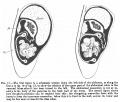File:Frazer1915 fig17.jpg: Difference between revisions
mNo edit summary |
mNo edit summary |
||
| (One intermediate revision by the same user not shown) | |||
| Line 3: | Line 3: | ||
The first figure is a schematic section down the left side of the abdomen, as along the line a. in fig. 16 or fig. 13, to show the relation of the upper part of the abdominal colon to the omental bursa after it has been turned to the left. The abdominal mesocolon is cut at m, and p is the body of the pancreas in the back wall of the bursa. The second figure shows how the adult condition can be reached from this: the elongating mesocolon fuses with the bursa to form the transverse mesocolon, below this it is fixed to the wall, and at its lower end may be free more or less for the iliac colon. | The first figure is a schematic section down the left side of the abdomen, as along the line a. in fig. 16 or fig. 13, to show the relation of the upper part of the abdominal colon to the omental bursa after it has been turned to the left. The abdominal mesocolon is cut at m, and p is the body of the pancreas in the back wall of the bursa. The second figure shows how the adult condition can be reached from this: the elongating mesocolon fuses with the bursa to form the transverse mesocolon, below this it is fixed to the wall, and at its lower end may be free more or less for the iliac colon. | ||
{{Historic Disclaimer}} | |||
{{1915 Frazer figures}} | |||
===Reference=== | ===Reference=== | ||
{{Ref-Frazer1915}} | {{Ref-Frazer1915}} | ||
{{Footer}} | {{Footer}} | ||
Latest revision as of 05:43, 9 January 2017
Fig. 17. Relation of the upper part of the abdominal colon to the omental bursa after it has been turned to the left
The first figure is a schematic section down the left side of the abdomen, as along the line a. in fig. 16 or fig. 13, to show the relation of the upper part of the abdominal colon to the omental bursa after it has been turned to the left. The abdominal mesocolon is cut at m, and p is the body of the pancreas in the back wall of the bursa. The second figure shows how the adult condition can be reached from this: the elongating mesocolon fuses with the bursa to form the transverse mesocolon, below this it is fixed to the wall, and at its lower end may be free more or less for the iliac colon.
| Historic Disclaimer - information about historic embryology pages |
|---|
| Pages where the terms "Historic" (textbooks, papers, people, recommendations) appear on this site, and sections within pages where this disclaimer appears, indicate that the content and scientific understanding are specific to the time of publication. This means that while some scientific descriptions are still accurate, the terminology and interpretation of the developmental mechanisms reflect the understanding at the time of original publication and those of the preceding periods, these terms, interpretations and recommendations may not reflect our current scientific understanding. (More? Embryology History | Historic Embryology Papers) |
- Links: Fig 1 | Fig 2 | Fig 3 | Fig 4 | Fig 5 | Fig 6 | Fig 7 | Fig 8 | Fig 9 | Fig 10 | Fig 11 | Fig 12 | Fig 13 | Fig 14 | Fig 15 | Fig 16 | Fig 17 | Fig 18 | 1915 Frazer | Intestine Development | Category:Intestine
Reference
Frazer JE. and Robbins RH. On the factors concerned in causing rotation of the intestine in man. (1915) J Anat. 50(1): 75-110. PMID 17233053
Cite this page: Hill, M.A. (2024, May 4) Embryology Frazer1915 fig17.jpg. Retrieved from https://embryology.med.unsw.edu.au/embryology/index.php/File:Frazer1915_fig17.jpg
- © Dr Mark Hill 2024, UNSW Embryology ISBN: 978 0 7334 2609 4 - UNSW CRICOS Provider Code No. 00098G
File history
Click on a date/time to view the file as it appeared at that time.
| Date/Time | Thumbnail | Dimensions | User | Comment | |
|---|---|---|---|---|---|
| current | 05:15, 9 January 2017 |  | 1,000 × 685 (108 KB) | Z8600021 (talk | contribs) | |
| 05:11, 9 January 2017 |  | 1,457 × 1,234 (263 KB) | Z8600021 (talk | contribs) | {{Historic Disclaimer}} ===Reference=== {{Ref-Frazer1915}} {{Footer}} |
You cannot overwrite this file.
File usage
The following 4 pages use this file:
